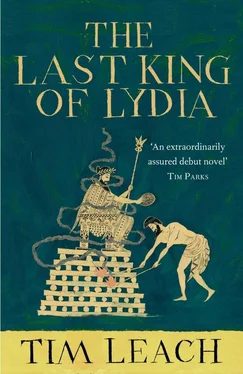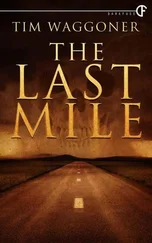Tim Leach - The Last King of Lydia
Здесь есть возможность читать онлайн «Tim Leach - The Last King of Lydia» весь текст электронной книги совершенно бесплатно (целиком полную версию без сокращений). В некоторых случаях можно слушать аудио, скачать через торрент в формате fb2 и присутствует краткое содержание. Год выпуска: 2013, ISBN: 2013, Издательство: Atlantic Books Ltd, Жанр: Исторические приключения, на английском языке. Описание произведения, (предисловие) а так же отзывы посетителей доступны на портале библиотеки ЛибКат.
- Название:The Last King of Lydia
- Автор:
- Издательство:Atlantic Books Ltd
- Жанр:
- Год:2013
- ISBN:9780857899200
- Рейтинг книги:5 / 5. Голосов: 1
-
Избранное:Добавить в избранное
- Отзывы:
-
Ваша оценка:
- 100
- 1
- 2
- 3
- 4
- 5
The Last King of Lydia: краткое содержание, описание и аннотация
Предлагаем к чтению аннотацию, описание, краткое содержание или предисловие (зависит от того, что написал сам автор книги «The Last King of Lydia»). Если вы не нашли необходимую информацию о книге — напишите в комментариях, мы постараемся отыскать её.
The Last King of Lydia — читать онлайн бесплатно полную книгу (весь текст) целиком
Ниже представлен текст книги, разбитый по страницам. Система сохранения места последней прочитанной страницы, позволяет с удобством читать онлайн бесплатно книгу «The Last King of Lydia», без необходимости каждый раз заново искать на чём Вы остановились. Поставьте закладку, и сможете в любой момент перейти на страницу, на которой закончили чтение.
Интервал:
Закладка:
Adrastus watched him go, his eyes empty of hope.
North-west of Sardis, another city rose from the plains. At dawn or dusk, a lost traveller might have mistaken this place for Sardis itself. He would see towering shapes looming ahead of him, a human order imposed on nature’s formless aspect. It was only on drawing closer that the traveller would realize that he had been mistaken, that he had arrived instead at a silent city of the dead.
A hundred barrows rose from the ground, each white stone tomb covered with a great mound of clay, as if a god had reached from the sky, lifted earth with the palm of his titanic hand, and scattered it over the barrow to honour the dead. The finest Lydian stonework was to be found buried in these great barrows. In this land, the living passed their lives in crude houses of reed and mud brick, the dead lay in flawless marble. What honour was there in building a great house that would change hands with every generation; that would become the prize of some other man, some other king? It was the last home, the one place that truly belonged to only one man, that was most worthy of a great architect’s craft.
One tomb towered above the rest — the tomb of Alyattes, Croesus’s father. There were those who came from distant lands to stand in the shadow of this great barrow, to marvel at what men had learned to build. Beside this great tomb, as was the custom, lay the tomb for the next royal burial, in the shadow of Alyattes’s, a respectful fraction of the size. Croesus had commissioned it long ago, thinking that it would be his own resting place. He had never thought he would use it to bury his son.
The funeral procession gathered by the barrow, in a semicircle to the west, facing the setting sun. Looking over the mourners, Croesus could see only a sickly reflection of those who had gathered at the wedding a short time before. Every member of the Lydian nobility was there, some in sympathy, others out of duty or ambition. Danae and Iva clung to each other, the mother and the widow both exhausted by their grief, only together finding the strength to stand. His eyes fell last on Gyges, who had followed them all the way from the city. For once, Croesus did not care what impression his troubled son might make in the eyes of others, but the boy remained still and silent throughout the ritual. Croesus wondered if this was his way of showing grief, if here at last was something of their world that Gyges could understand.
The priests came forward and made their sacrifices. They lifted the viscera in their hands, weighing them, smelling them, tasting them, and they declared that the auguries were good. They knelt on the ground, and began to chant. They faced west, waiting for the sun to fall from the sky.
As the sun touched the horizon, the chants grew louder, more forceful. From the base of the barrow, six slaves began to walk up the side of the mound, bearing a casket on their shoulders. They marched towards the mourners, the setting sun at their backs, and laid the casket down. One by one, the nobles came forward to place their gifts in the casket. Last of all, the hunters came forward and laid down their notched and broken weapons.
The sun sank fully below the horizon, and the slaves came forward again, bearing torches in their hands, as if they had caught some last spark from the fading sun. Just as they reached the bier, as they were about to bend down and set their torches to the wood of the casket, a voice rang out, calling for them to halt. The voice of the king.
The priests eyed him with uncertainty as he walked to the casket, fearful that the king might commit some sudden blasphemy. Croesus passed the torchbearers, and knelt. He reached into the pile of hunter’s weapons, shuddering as his hand brushed against the casket, and drew out one of the weapons in particular. A spear. He stood and raised the weapon, gripping it tight enough to feel his pulse echo through the wood and return to his hand, like an answering call. Though the tip had been carefully cleaned and polished, he recognized it for what it was.
He placed the spear on the ground, and with one stamp of his foot, like a man who breaks the neck of a sick dog, he broke away the point. Croesus picked up the spearhead and placed it within the folds of his robes, close to his heart. He walked away, and listened to the rush of the flames as the slaves cast their torches down, as the fire took what remained of his son. He did not stay to watch.
The priests made their final prayer, a plea for the Gods to be merciful and accept the prince’s soul, and the crowd gave a single, brief cry, like the first gasp of a child. Some remained for a time to watch the flames, others left immediately and followed close behind the king. One by one, the mourners turned and made their way back towards the city.
Up on the hills, a single figure watched the procession depart. Watched, and waited for the night to come.
9
When, later, Iva entered Croesus’s private chamber, at first she could not see the king. A few small candles, lit and scattered seemingly at random, gave little light. As her eyes adjusted to the near dark, she found him, seated in shadow, so still that she mistook him for a carved sculpture. He gestured silently for her to sit opposite him.
‘You asked for me?’ she said.
‘Yes, I did. Will you take some wine?’
‘I. . yes.’ He poured out a cup, added the smallest trace of water to it, then placed it on the other side of the table. He did not pour any for himself.
‘You were very brave at the funeral today,’ he said. ‘It is not an easy thing to bury a husband.’
‘Not an easy thing to bury a son,’ she ventured.
‘Yes. Well.’ He looked down and picked absently at the engraving on the table. ‘Did he ever tell you that I dreamed of his death?’
‘Yes.’
‘I suppose you laughed about it together. Laughed at me. The foolish thoughts of a silly old man.’
‘No. Atys would never laugh at you.’
‘I’m sure. I pressed him to marry young, you know. But he always refused the women I brought him. Fine ladies. Most of them from better families than yours. But he wanted to wait, to marry for love. He loved you.’ He looked up from the table. ‘Did you love my son?’
‘Yes,’ she whispered.
‘Are you carrying his child?’
She stared at him and said nothing.
‘I see I shall have to repeat myself. Are you carrying his child?’
‘No.’
‘Are you sure? He did not leave so long ago. Perhaps-’
‘No. I am sure. I’m sorry.’
‘I see.’ He nodded slowly. ‘A shame. It would be better if there were a child.’ Croesus poured himself a cup of unwatered wine, and drank it down in a single draught. ‘What should I do? Leave my empire to my idiot son?’
‘I don’t know.’ She hesitated. ‘Perhaps your wife-’
‘My wife? No. Her womb is stopped. Since she gave birth to Gyges. He has been a curse in many different ways.’
She said nothing.
‘It really would be better if you had a child.’
‘I don’t understand.’
He hesitated. ‘You are very beautiful,’ he said.
She looked to the door.
‘They won’t let you,’ he said. ‘The guards, I mean. Not without my order.’
‘My lord-’
He poured her another cup. ‘Come. Drink with me. Don’t look so frightened. You misunderstand.’
Her hand shook slightly, but steadied as she took the silver cup and drank deeply.
‘Was he kind to you, my son?’ the king said.
‘Yes.’
‘He was shy when he was courting you, was he not?’
She felt the ghost of a smile pass over her face. ‘Yes. I could not understand why the king’s son seemed so nervous around me. I thought that was just his way with everyone.’
Читать дальшеИнтервал:
Закладка:
Похожие книги на «The Last King of Lydia»
Представляем Вашему вниманию похожие книги на «The Last King of Lydia» списком для выбора. Мы отобрали схожую по названию и смыслу литературу в надежде предоставить читателям больше вариантов отыскать новые, интересные, ещё непрочитанные произведения.
Обсуждение, отзывы о книге «The Last King of Lydia» и просто собственные мнения читателей. Оставьте ваши комментарии, напишите, что Вы думаете о произведении, его смысле или главных героях. Укажите что конкретно понравилось, а что нет, и почему Вы так считаете.












